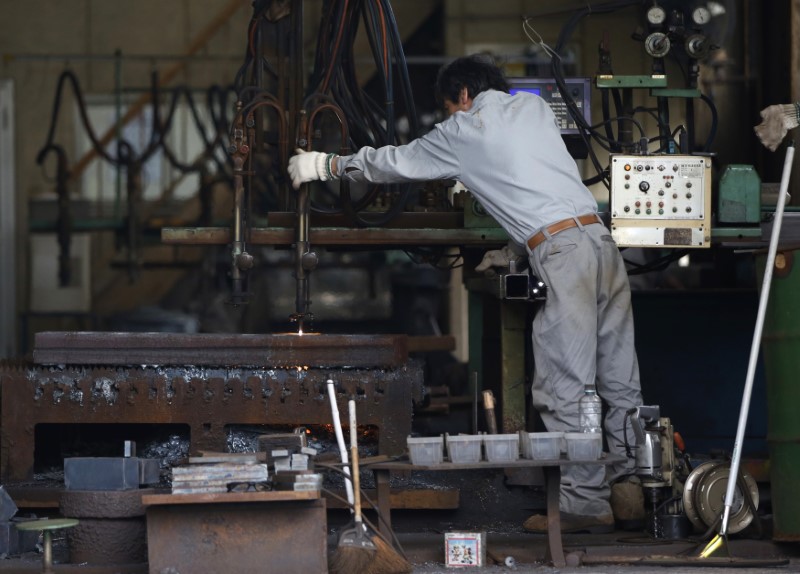By Leika Kihara and Tetsushi Kajimoto
TOKYO (Reuters) - Japanese big manufacturers' business confidence improved for a second straight quarter to hit a one-and-a-half year high in March, a closely watched central bank survey showed, a sign the benefits of an export-driven economic recovery were broadening.
Service-sector sentiment improved for the first time in six quarters and firms remained upbeat on their capital expenditure plans, the Bank of Japan's "tankan" survey showed, offering hope the economic recovery will gather momentum in coming months.
While separate PMI data showed a slight slowdown in manufacturing activity in March, the upbeat tankan reinforces a dominant market view the central bank's next policy move would be to reduce rather than expand monetary stimulus.
"The tankan showed a balanced improvement in corporate sentiment at manufacturers and service-sector firms," said Yuichiro Nagai, an economist at Barclays (LON:BARC) Securities.
"Overall, the results support the BOJ's rosy view on the economy."
The headline index measuring big manufacturers' business sentiment rose to plus 12 in March from plus 10 three months ago, the tankan showed on Monday, falling short of market forecasts but marking the highest reading since December 2015.
Service-sector sentiment also improved for the first time in six quarters to hit a one-year high, on brightening business prospects among retailers, hotels and restaurants.
PRICE PRESSURE RISING
Japan's economy has shown signs of life in recent months, with exports and factory output benefiting from a recovery in global demand.
Big companies expect conditions to worsen slightly in the coming three months, as risks to global trade such as Britain's decision to leave the European Union and U.S. President Donald Trump's protectionist statements cloud the outlook.
Automakers saw business conditions deteriorating three months ahead, underscoring concerns over how Trump's policies could affect global trade.
Still, the survey found big firms plan to increase capital spending by 0.6 percent in the fiscal year ending in March 2018, compared with a median market forecast for a 0.1 percent drop.
"There has been talk about the risks of protectionism, but so far Japanese companies are not taking any specific steps related to this," said Norio Miyagawa, senior economist at Mizuho Securities.
"This tankan will reinforce expectations that the BOJ is on hold for the time being. We certainly don't see the need to ease or tighten policy," he said.
With inflation expected to accelerate later this year, a growing number of analysts now predict the BOJ's next move would be to start scaling back its massive monetary stimulus.
While inflation remains well below the BOJ's 2 percent target, there were tentative signs a steady economic recovery could prompt companies to raise prices and wages.
The tankan indices showed more companies felt prices of goods and services were rising, in line with increases in raw material costs.
Firms surveyed in the tankan also saw the job market tightening the most since 1992, when Japan's economy was booming from an asset-inflated bubble.
Companies' capacity usages continued to rise. An index measuring production capacity, which falls when more firms report capacity shortages, slid to levels last seen in 1992, suggesting they will ramp up capital spending ahead.

BOJ officials have said they will maintain the bank's massive stimulus until sustained rises in wages and strength in private consumption keep inflation stably above 2 percent.